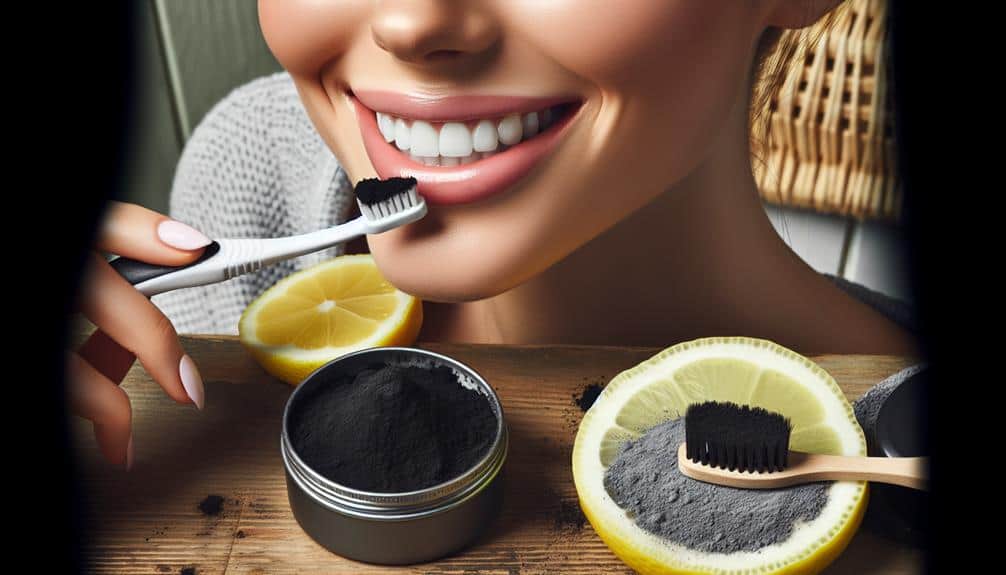Transform your smile naturally with the powerful antibacterial effects of tea tree oil. To whiten your teeth, mix the oil with baking soda to create a paste, then gently brush your teeth with the mixture. Remember not to swallow it, as it can be harmful. Always consult a dentist prior to verifying it's safe for you, especially if you have pre-existing conditions. By following these steps, you can benefit from the whitening properties of tea tree oil but remember, there is more to learn about its additional benefits and applications.
Key Points
- Tea tree oil combats oral bacteria and plaque for whiter teeth.
- Create a homemade mouthwash with tea tree oil for oral hygiene.
- Mix oil with baking soda for a natural whitening paste.
- Dilute tea tree oil properly to avoid toxicity.
- Consult a dentist before using tea tree oil for whitening.
Benefits of Tea Tree Oil
When used correctly, tea tree oil can offer a myriad of benefits for oral health and teeth whitening. Tea tree oil is renowned for its potent antibacterial properties, making it a powerful ally in combating oral bacteria that cause plaque and gum disease. Beyond its oral benefits, tea tree oil is also widely used in skincare due to its ability to soothe and treat various skin conditions such as acne, eczema, and fungal infections. Additionally, this versatile oil is a popular choice in aromatherapy for its invigorating and invigorating scent, which can help uplift your mood and alleviate stress.
Tea tree oil's natural properties can help reduce inflammation and soothe irritated gums, promoting overall oral health. Its antimicrobial nature can also aid in preventing bad breath by targeting the bacteria causing the issue. Moreover, in skincare, tea tree oil's antiseptic qualities make it an effective treatment for blemishes and can help promote clear and healthy skin. In aromatherapy, the oil's fresh and medicinal fragrance can help create a calming atmosphere, making it a popular choice for relaxation and stress relief.
How to Use Tea Tree Oil
To effectively utilize tea tree oil for oral health and teeth whitening, it's important to understand the proper methods of application and dosage. Tea tree oil benefits oral hygiene due to its natural antibacterial properties, which can help combat bacteria in the mouth and promote overall dental health.
One of the common tea tree oil uses for teeth whitening is to create a homemade mouthwash. To make this, add a few drops of tea tree oil to a cup of water and use it as a mouth rinse after brushing your teeth.
Another way to use tea tree oil is by mixing it with baking soda to create a natural teeth whitening paste. Simply mix a small amount of baking soda with a drop of tea tree oil to form a paste, then apply it to your toothbrush and brush your teeth gently.
Safety Precautions
For essential safety when using tea tree oil for teeth whitening, it's important to adhere to recommended guidelines and precautions. When incorporating tea tree oil into your oral care routine, there are important oral health precautions to take into account. Initially, never swallow tea tree oil as it can be toxic when ingested. Always dilute the oil properly before use to prevent any adverse reactions. It's vital to perform a patch test before applying tea tree oil to your teeth to check for any allergic reactions or sensitivities.
Potential side effects of using tea tree oil for teeth whitening may include irritation of the gums or oral tissues. If you experience any discomfort, discontinue use immediately and rinse your mouth thoroughly with water. It's advisable to consult with a dentist before using tea tree oil for teeth whitening, especially if you have pre-existing dental conditions.
Tea Tree Oil Whitening Recipes
Enhance your teeth whitening routine with these effective and simple tea tree oil whitening recipes. Tea tree oil is renowned for its natural remedies and benefits for oral hygiene. Here are two DIY recipes to incorporate into your dental care regimen:
- Tea Tree Oil and Baking Soda Paste:
- Mix 1 tablespoon of baking soda with a few drops of tea tree oil to form a paste.
- Apply the paste to your toothbrush and brush your teeth gently for 2 minutes.
- Rinse thoroughly with water.
- Baking soda helps to scrub away surface stains while tea tree oil freshens breath and fights bacteria.
- Tea Tree Oil Mouthwash:
- Add 1-2 drops of tea tree oil to a cup of water.
- Swish the solution in your mouth for 30-60 seconds.
- Spit out the mouthwash and avoid swallowing.
- Tea tree oil's antibacterial properties can help improve oral hygiene and reduce plaque buildup.
Incorporating these natural remedies into your dental routine can aid in maintaining a healthy, bright smile.
Maintenance Tips
For ideal oral health and to extend the effects of your whitening routine, incorporate the following maintenance tips into your daily dental care regimen.
- Brush and Floss Regularly: Maintaining good oral hygiene through daily brushing and flossing is essential for preventing stains and keeping your teeth white.
- Limit Staining Foods and Beverages: Cut down on consumption of coffee, tea, red wine, and other foods known to stain teeth to preserve your whitening results.
- Use a Straw: When drinking beverages that may stain your teeth, using a straw can help minimize contact between the liquid and your teeth.
- Regular Dental Check-ups: Schedule routine dental visits for professional cleanings and check-ups to catch any issues early and maintain peak oral health.
- Consider Touch-up Treatments: Depending on your whitening method, occasional touch-up treatments may be necessary to keep your teeth looking their best.
Frequently Asked Questions
Can Tea Tree Oil Be Used as a Teeth Whitening Treatment for Individuals With Sensitive Teeth?
Tea tree oil can help manage sensitivity while whitening teeth effectively. If you have sensitive teeth, consider alternatives like coconut oil pulling or baking soda. These natural ingredients can be gentler and still aid in whitening.
Is It Safe to Use Tea Tree Oil Teeth Whitening if You Have Dental Restorations Like Crowns or Veneers?
Using tea tree oil for teeth whitening when you have dental restorations like crowns or veneers may not be safe. There are dental implications and safety concerns due to the potential impact on cosmetic dentistry and restoration compatibility.
Can Tea Tree Oil Teeth Whitening Cause Any Adverse Effects on Oral Health in the Long Term?
Long term use of tea tree oil teeth whitening may pose risks to your oral health. Consider potential concerns like enamel damage or gum irritation. Monitoring any adverse effects and seeking advice from a dental professional are crucial.
How Long Does It Typically Take to See Noticeable Results From Using Tea Tree Oil for Teeth Whitening?
To see noticeable results from using tea tree oil for teeth whitening, apply it consistently every day. Typically, you can expect to start seeing improvements within a few weeks. Maintain good oral hygiene for best results.
Are There Any Specific Dietary or Lifestyle Changes That Can Enhance the Effectiveness of Tea Tree Oil Teeth Whitening Treatments?
To enhance the effectiveness of tea tree oil teeth whitening treatments, consider diet modifications such as reducing sugary foods and beverages. Lifestyle changes like quitting smoking can also aid in achieving whiter teeth. Natural and home remedies work best with healthy habits.



